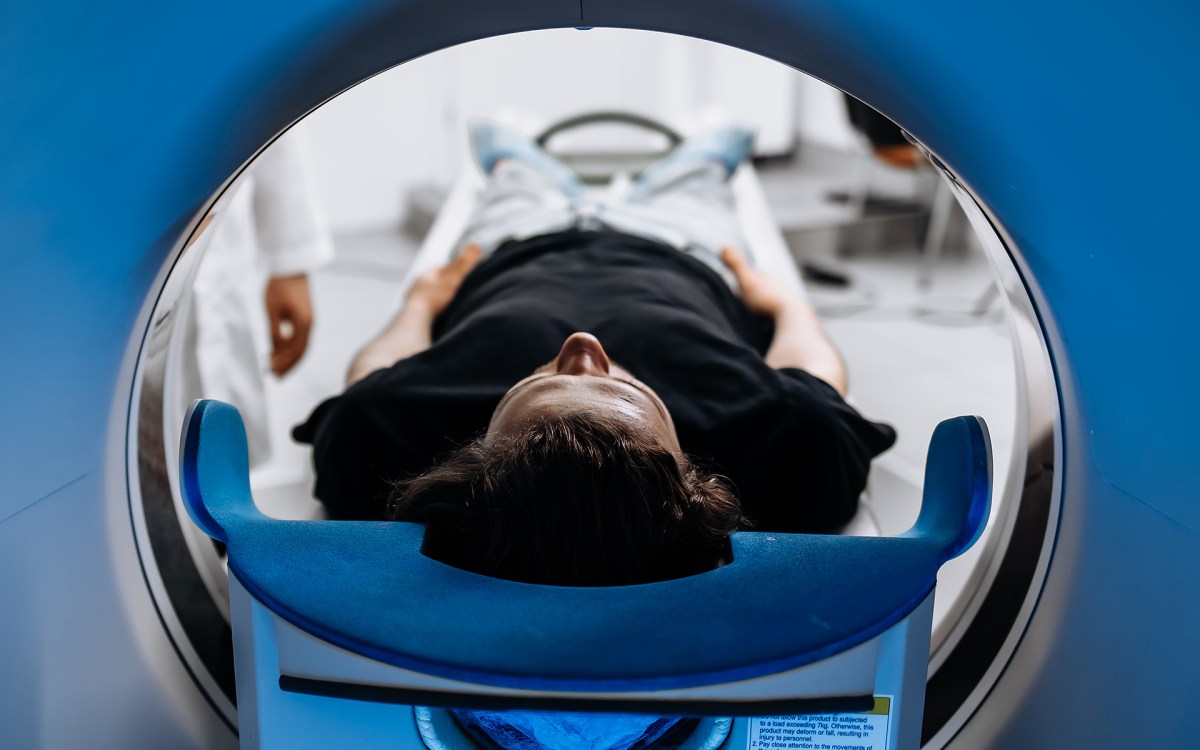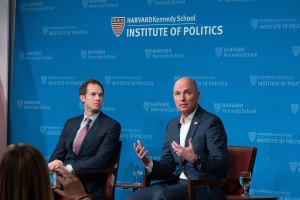Tag: Research
-
Campus & Community
Steinitz retires from GSD, plans to pursue research, part-time teaching
Dean of the Harvard Graduate School of Design (GSD) Alan Altshuler recently announced that Carl Steinitz has retired from his tenured professorship to become the Alexander and Victoria Wiley Research Professor of Landscape Architecture and Planning (effective July 1). In this role, Steinitz will remain active in research and will continue to instruct part-time at…
-
Health
Sex differences in brains reflect disease risks
Women’s brains are different from men’s. That’s not news. What is news is that the differences are smaller than most people believe. They are not big enough to say that one sex is smarter or better at math than the other.
-
Campus & Community
Hoopes Prize winners for ’07 are announced
More than 70 Harvard College seniors have been named Thomas T. Hoopes Prize winners for outstanding scholarly work or research. The prize is funded by the estate of Thomas T. Hoopes ’19. The recipients, including their research and advisers, are as follows:
-
Campus & Community
Radcliffe awards ’07 Fay Prize to two pioneering Harvard seniors
The Radcliffe Institute for Advanced Study at Harvard University has named Harvard seniors Rowan W. Dorin, a history concentrator, and Emily Vasiliauskas, a literature concentrator, the winners of its 2007 Captain Jonathan Fay Prize. Both winners were selected for their senior theses, which provide important, new contributions to their respective fields. Dorin was selected for…
-
Campus & Community
Committee on African Studies awards grants
The Harvard Committee on African Studies has awarded 13 research grants for Harvard undergraduates and graduate students to travel to sub-Saharan Africa during the summer of 2007. The undergraduates are juniors who will be doing research for their senior honors theses. The graduate students will be conducting research for their doctoral dissertations.
-
Campus & Community
Davis Center announces award winners
The Davis Center for Russian and Eurasian Studies has announced the recipients of fellowships, prizes, research travel grants, and internships for 2007-08.
-
Science & Tech
Single spinning nuclei in diamond offer a stable quantum computing building block
Surmounting several distinct hurdles to quantum computing, physicists at Harvard University have found that individual carbon-13 atoms in a diamond lattice can be manipulated with extraordinary precision to create stable quantum mechanical memory and a small quantum processor, also known as a quantum register, operating at room temperature. The finding brings the futuristic technology of…
-
Health
Red wine, taken in moderation, reduces risk of prostate cancer
Men who drink moderate amounts of red wine are only half as likely to be diagnosed with prostate cancer as those who don’t drink it at all, according to a report in the June issue of Harvard Men’s Health Letter. What’s more, the beverage seems to be especially protective against the most advanced and aggressive…
-
Health
Major progress toward cell reprogramming; researchers approach key goal of biologists
Two Harvard Stem Cell Institute (HSCI) researchers and scientists at Whitehead Institute and Japan’s Kyoto University have independently taken major steps toward discovering ways to reprogram cells in order to direct their development – a key goal in developmental biology and regenerative medicine.
-
Campus & Community
Radhika Nagpal nets prestigious NSF award for up-and-coming researchers
Radhika Nagpal, assistant professor of computer science in Harvard’s School of Engineering and Applied Sciences (SEAS), has won a Faculty Early Career Development Award from the National Science Foundation (NSF). The honor is considered one of the most prestigious for up-and-coming researchers in science and engineering.
-
Nation & World
Women in science: Good news, bad news
It is the best of times, and it is the worst of times. At Harvard’s fourth National Symposium on the Advancement of Women in Science, it was clear why female scientists need to keep meeting like this.
-
Health
When fish first started biting
Before fish began to invade land, about 365 million years ago, they had some big problems to solve. They needed to come up with new ways to move, breathe, and eat.
-
Health
Researchers develop ALS mouse stem cell line
A team of Harvard researchers has used embryonic stem cells, derived from mice carrying a human gene known to cause a form of amyotrophic lateral sclerosis (ALS), to create an in vitro model of the always-fatal neurodegenerative disease.
-
Arts & Culture
Archaeological bookends in Copán Valley
COPÁN RUINAS, Honduras – A short drive from the main Maya ruins at Copán, a forested hillside holds a cluster of mounds that Peabody Museum archaeologists believe date from near the end of the great Maya civilization that once dominated the region.
-
Health
Humans hot, sweaty, natural-born runners
Hairless, clawless, and largely weaponless, ancient humans used the unlikely combination of sweatiness and relentlessness to gain the upper hand over their faster, stronger, generally more dangerous animal prey, Harvard Anthropology Professor Daniel Lieberman said Thursday (April 12).
-
Campus & Community
Kuwait Program Research Fund now accepting grant proposals
The Kennedy School of Government (KSG) has announced the 12th funding cycle for the Kuwait Program Research Fund.
-
Nation & World
HSPH study shows guns in homes linked to higher rates of suicide
In the first nationally representative study to examine the relationship between survey measures of household firearm ownership and state-level rates of suicide in the United States, researchers at the Harvard School of Public Health (HSPH) found that suicide rates among children, women, and men of all ages are higher in states where more households have…
-
Nation & World
Global momentum for smoke-free society
In a perspective article in the April 12 issue of The New England Journal of Medicine (NEJM), researchers from the Harvard School of Public Health (HSPH) and the Association of European Cancer Leagues describe the growing momentum for indoor smoking bans in countries across the globe. They identify Ireland’s pioneering 2004 comprehensive indoor smoking ban…
-
Science & Tech
New tourism threatens desert ecosystems worldwide
The Department of Urban Planning and Design at the Harvard Graduate School of Design (GSD) hosted a conference April 4-5 titled “Desert Tourism: Delineating the Fragile Edges of Development.” Panel discussions with leading architects, planners, and developers explored the relationship between tourism, social development, and the architecture and landscapes of arid regions around the world.
-
Health
Eradicating polio better option than control
Concerns about the high perceived costs of eradicating the relatively low number of polio cases worldwide have led to recent suggestions that it is time to shift from a goal of eradication to control: abandoning eradication and allowing wild poliovirus to continue to circulate, which proponents of control believe can sustain the low number of…
-
Arts & Culture
Harvard researchers head south to preserve ancient inscriptions
Researchers from the Peabody Museum of Archaeology and Ethnology are preparing to head into the Central American rain forest to begin an ambitious, multiyear project to scan and digitize fading Maya inscriptions and carvings.
-
Health
Manipulating genetic switch in mice eases MD symptoms
Scientists at Dana-Farber Cancer Institute have shown in a laboratory study that revving up a crucial set of muscle genes counteracts the damage caused by a form of muscular dystrophy.
-
Science & Tech
Libraries, museums meet with IT
The ability to search the actual text of millions of books — instead of just titles or summaries — will change the way students and academics conduct research, revealing a host of new sources invisible to current search methods, a Harvard University Library official working on the Google project said on March 28.
-
Science & Tech
Collaboration yields first citywide network of wireless sensors
Harvard University, BBN Technologies, and the city of Cambridge have begun a four-year project to install 100 wireless sensors atop streetlights in Cambridge, Mass., creating the world’s first citywide network of wireless sensors.
-
Health
Finding the start of Alzheimer’s disease
Faces are hard to remember. Even harder are the names that go with them. It’s one of the most common problems people face as they get older.
-
Health
Weight gain in pregnancy linked to overweight in kids
Pregnant women who gain excessive or even appropriate weight, according to current guidelines, are four times more likely than women who gain inadequate weight to have a baby who becomes overweight in early childhood. These findings are from a new study at the Department of Ambulatory Care and Prevention of Harvard Medical School (HMS) and…
-
Science & Tech
Warming may not spark tree growth
A bright spot in the gloomy global warming picture has been scientists’ predictions that at least some carbon dioxide will be removed from the atmosphere by a burst of growth from tropical forests. New research from the Arnold Arboretum, however, questions that prediction, finding that trees in two forests on opposite sides of the world…
-
Campus & Community
Accelerating science with innovative computing
How daunting a task is it, in an age when it is possible to visualize structures and to see them at magnifications not even dreamed of a short time ago, to produce a “wiring diagram” of the human brain?
-
Campus & Community
New department approved
The Harvard Corporation has approved, with the support of the deans of the Faculty of Arts and Sciences (FAS) and the Harvard Medical School (HMS), the establishment of a new Department of Developmental and Regenerative Biology, the first academic department in Harvard’s 371-year history to be based in more than one of the University’s Schools.…
-
Health
Smile and the world smiles with you, but why?
“We are connected in ways we don’t consciously know, but which are absolutely essential for communication,” said psychologist and author Daniel Goleman at a March 14 talk on social intelligence sponsored by the John F. Kennedy School of Government’s Center for Public Leadership. “There is a subterranean emotional economy that’s part of any interaction.”


